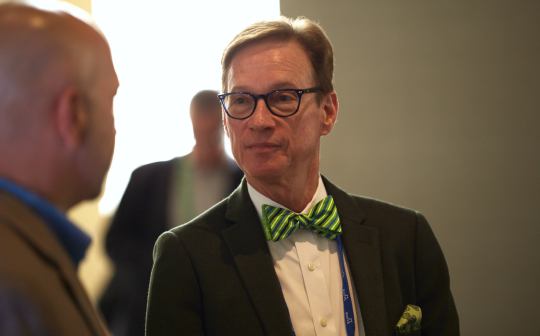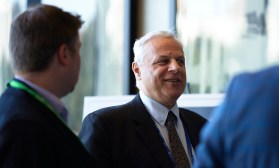Former CIOs find special bond in state IT community

When Kristin Russell left her position as state chief information officer in Colorado, she didn’t envision staying actively connected with the folks who make up the state IT community. She was wrong. And she’s not alone.
“It’s funny,” said Russell, who moved on to lead Deloitte’s digital government efforts in June 2014. “I would always come to [National Association of State Chief Information Officers] meetings and get introduced to a former CIO and think that was weird.”
Russell always thought that when she was done working in the public sector, she would truly be done, she told StateScoop. Instead, she found the community developed by state CIOs — a select group of people who understand exactly what life as the leader of IT in any given state was like — was too hard to walk away from.
“There’s this very special community that exists, and I see it even now as I’m talking to my former colleagues and now clients,” Russell said. “Once you’ve traveled down this path, it’s something special that happens. It’s hard to describe, but when you’re out there, you’re one of 50 people who have, or had, a similar job.”
And Russell’s story is not a singular one — several former CIOs attended NASCIO’s April midyear conference in Alexandria, Virginia. Among them was former Pennsylvania CIO Tony Encinias, who told StateScoop in a video interview that he planned to continue serving as an advocate for state CIOs and give them advice.
Encinias, who left state service earlier this year and took on a role at ViON, said he misses the camaraderie he felt with his team and the reward of working to improve citizens’ lives.
“Serving the citizens of Pennsylvania was really what I loved doing,” Encinias said. “I came to work every day knowing that I was doing something to the betterment of citizens of Pennsylvania.”
Jerry Fralick, who served as North Carolina’s CIO from 2009 to 2012, as well as a department CIO within the U.S. Justice Department, said the relationship between CIOs was something he struggled to leave. In his new role as Lenovo’s chief security officer, Fralick regularly works with and advises members of the state IT community on cybersecurity.
“The CIO community is like a fraternity or sorority,” Fralick told StateScoop. “That’s kind of how I look at it, and you need to stay engaged with the people because even as technology changes, there’s a certain atmosphere or realm that you can still contribute and you can still participate.”
The NASCIO 2015 attendee list was also peppered with a few other former state CIOs who came to the conference to represent their private sector employers. Karen Robinson, formerly Texas’ CIO, attended the conference representing Robots and Pencils Inc., where she works as president, and Claire Bailey, the former director of Arkansas’ Department of Information Systems, attended as the director of federal, state and local solutions for Compuware Corp.
While each CIO left his or her post for different reasons, Russell said that the decision to leave public sector is never easy — and the sustained involvement in the state IT community through private sector roles helped ease the transition.
“I came into Colorado for a very specific reason, and that’s because I felt like I could add value and learn,” Russell said. “You give your heart and soul to it, and you work on really meaningful work. There’s never a perfect time that gets established that says, ‘this is the time that you’re going to leave,’ but for me, I really felt like I had set it up for the next CIO to come in and stabilize a lot of the things that we had put in place.”
For Fralick, who consulted briefly for the next North Carolina CIO’s team, the decision to leave wasn’t his — he stepped down when Gov. Bev Perdue left office — but he felt he needed to pass along advice to the incoming CIO and other CIOs in the community.
“When the new governor came into town, his transition team actually called me and asked me what I would have done if I had stayed,” Fralick said. “It’s the same advice that I’ve given to [state CIO] Chris Estes — you’ve got to surround yourself with people you can count on to get the work done.”





